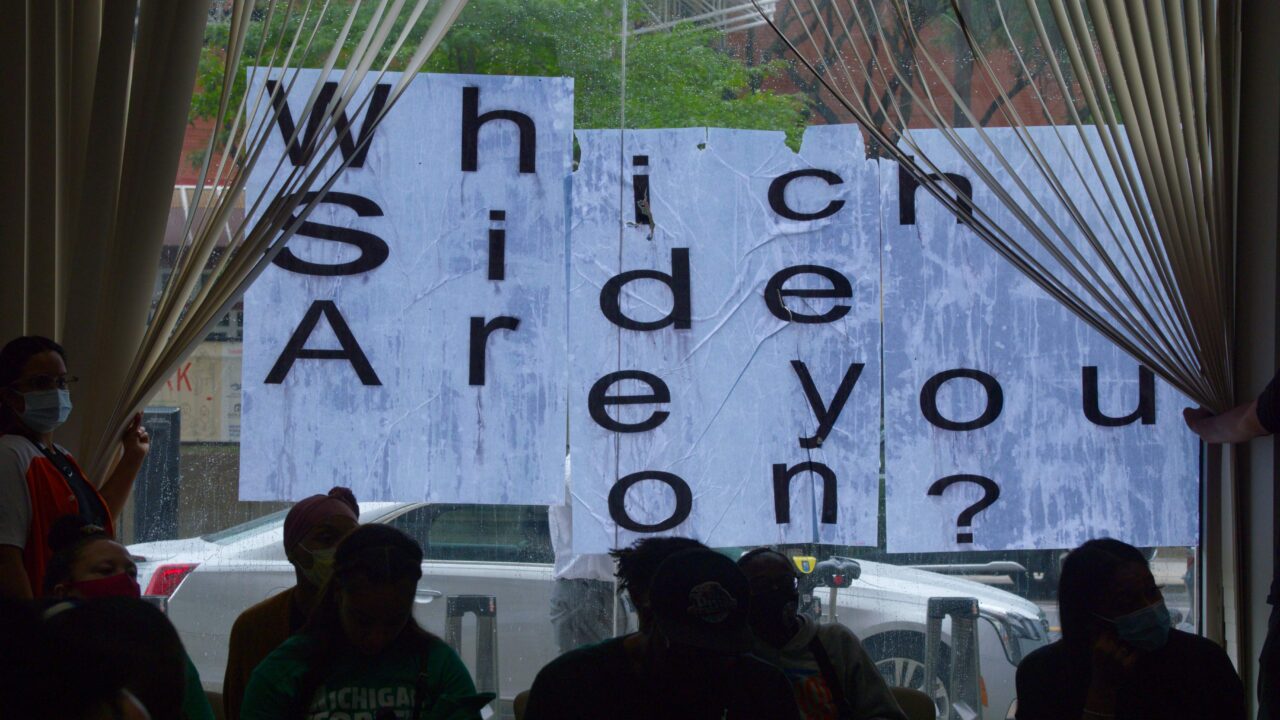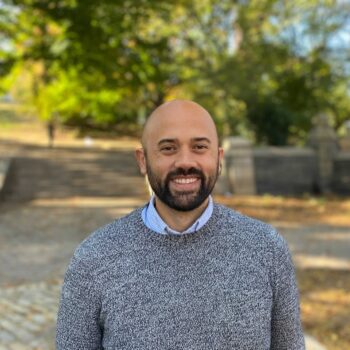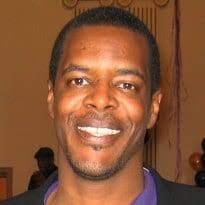In late July of 2022, fifty members of the Defend Black Voters Coalition filed into a utility commission meeting in Detroit, Michigan. We waited patiently for other speakers to take their turns in an otherwise unremarkable meeting before MOSES Action–affiliated gospel singer Corzetta Renee stepped forward to give public comment.
When she approached the microphone, Renee thanked the commissioners on behalf of our coalition for the warm reception they had given us while hearing our concerns over the past several months. She reiterated our coalition’s demand that the commission deny DTE Energy’s requested rate hike of 9 percent, or $388 million. The Detroit-based company is the largest electric utility provider in the state, and it had been dumping millions of dollars into Michigan’s capital of Lansing for years to escape accountability from regulators and lawmakers for its unreliability despite exuberant costs to consumers.
“Michiganders suffer the highest electric rates in the Midwest and the worst power outages because our regulators and lawmakers have too long worked for the utilities and not the people,” Renee told the commission. “We’re taking back our power.”
Since 2015, DTE has contributed $770,120 to the right-wing extremist lawmakers in the state legislature backing a thinly veiled initiative called Secure MI Vote (SMV) that would make it harder for Black and low-income Michiganders to vote by design. Despite investigation after investigation showing that the 2020 presidential election was the most secure on record, these lawmakers continued to use the “big lie” of voter fraud as an excuse to back such legislation. For example, a key measure within SMV would require voter ID. The architects of SMV are well aware that 25 percent of Black voting-age citizens lack the necessary identification for such measures, compared to only 8 percent of white voting-age citizens. Given the overwhelming propensity of Black voters to vote against the Republican Party, they are more than willing to trade democracy and civil rights for a win at the polls.
Defend Black Voters Is Born
This corporate-funded attack on civil rights and democracy was the impetus for us to form Defend Black Voters, a multiracial coalition headed by five Black-led, Michigan-based racial justice organizations—MOSES Action, Detroit Action, Michigan People’s Campaign, Mothering Justice Action Fund, and Emergent Justice—convened by Community Change Action. Together, we decided to engage the largest corporate contributors with the goal of pressuring them to cut off the lawmakers that remained committed to voter suppression, or else publicly expose the companies backing these lawmakers in ways that make them think twice about supporting extremist politicians in the future.
DTE and the other major utility in Michigan, Consumers Energy, were the focus of our “Taking Back Our Power” initiative—an effort to make lawmakers and regulators start working for the people instead of the utilities. We chose to take our public message to the state utility regulatory agency, the Michigan Public Service Commission (MPSC). Given DTE’s track record, our demand of the regulators was that they hold the utility companies accountable. While we understood that the commissioners couldn’t yet legally respond to our request to reject DTE’s rate hike, they had just denied our written request for the commission to hold what would be the first public hearing on a rate case.
At the public meeting, Renee explained that the MPSC’s response was unacceptable and then launched into a stirring rendition of “Which Side Are You On?”, the classic mineworker and civil rights movement song that we had tailored for the commissioners.
Here in the Motor City,
We won’t pay another dime.
How about these regulators,
Decide to grow a spine?
We stood up and joined her as we pulled back the center curtain to show a large “Which side are you on?” sign. Other attendees at the meeting joined in. At the end of the song, Renee raised her fist to silence her choir. She said, “Well, commissioners, what’s it going to be? Are you going to hold a public hearing on the DTE rate case?”
With all eyes on the commissioners, the tension was palpable. Two of the three commissioners at the center of the room looked down at their laptops awkwardly, as if an important email had just come in. The chair in the middle looked at Renee and smiled sheepishly, but he didn’t speak. After several moments of being able to hear a pin drop, she clarified, “That wasn’t a rhetorical question.”
At that, commission chair Dan Scripps said, “Well, normally we don’t respond to public comment . . . but you sang, so . . .” Then he started searching for an explanation for the position that he no longer seemed to want to defend. When he stopped, Renee responded, “Thank you, but that doesn’t sound like an answer.” She signaled for us to start singing again as we made a slow exit to hold a press conference outside.
A Historic Win on the DTE Rate Case
Three days later, the commission reached out to let us know they were changing their position and working out logistics to hold a public hearing in August, which would effectively create a precedent for future hearings. The MPSC chose to do the right thing by giving the public a chance to speak to the regulators that have a mandate to serve the public interest—and we were proud of our role in helping them come to that decision.
In August 2022, along with allied racial and environmental justice organizations, we packed the first ever public hearing of its kind with people who were fed up with high rates, power outages, and a company that had been extracting money from Detroiters and using it to disenfranchise them. We garnered major local media attention, and elected leaders like Rep. Rashida Tlaib backed us up with fiery speeches.
A few days later, after another storm left five hundred thousand people without power—many for almost a week—the utility commission used their power to mandate a third-party audit for the first time, stating that this was part of a “new approach” to hold the largest utility companies accountable.
Then in November came another remarkable step by the MPSC. They announced that the commission was denying 92 percent of the $388 million rate hike request from DTE. It was the most complete denial of a rate hike in decades. And it may be one of the most severe direct financial consequences a company has experienced for supporting extremist politics.
Taking on Corporations by Air, Land, and Sea
But the fight wasn’t over, and the utility corporations weren’t the only Michigan-based companies supporting extremist legislators. Corporations dump money into politics to support their bottom line in any number of ways, and they often don’t care if the values of the politicians they support don’t match the values they profess to the public. The largest corporate contributors to the Michigan state lawmakers backing voter suppression had all previously declared that Black Lives Matter and even signed a statement opposing voter suppression. Our Defend Black Voters Coalition campaign targeted six of them: GM, Ford, Blue Cross Blue Shield of Michigan, and Delta Dental of Michigan, in addition to DTE and Consumers Energy.
Of these companies, the largest contributor to voter-suppression-backing lawmakers was Blue Cross Blue Shield of Michigan , which has a massive political spending program that is used, at least in part, to capture billions of dollars’ worth of public contracts with the state, universities, counties, and cities.
After BCBSM ignored our requests to meet, we got their attention in June 2022 at Michigan’s largest public policy conference, an aristocratic affair on Mackinac Island where political and corporate elite mingle and do business. BCBSM was the top conference sponsor. On the opening day, conference-goers on the ferry ride to the island had to pass a lighthouse on a small island in the Straits of Mackinac, where our coalition had traveled by boat in the early morning hours to hang a massive banner calling out the BCBSM CEO, stating, “Loepp, pledge to defend Black voters.” Then we marched on Grand Hotel, where police confronted us in front of conference participants, and an airplane flew overhead with a massive banner calling on BCBSM to stop funding the attack on Black voters. After taking the island by land, sea, and air, we were the hot topic of the Mackinac Policy Conference.
Following our direct action at the conference, Wayne County commissioner Jonathan Kinloch reached out to ask how he could support our efforts. He had been on the Wayne County Board of Canvassers during the 2020 election when the Republican half of the board temporarily refused to certify the vote, which included majority-Black Detroit. He shared our outrage that his Detroit constituents’ tax dollars were flowing to extremists trying to disenfranchise them through county contracts. Together, we passed the first contractor accountability resolution calling on public contractors doing business with Wayne County to align their political spending with the defense of democracy and civil rights in Michigan.
Next, we got to work at Michigan State University (MSU), another BCBSM client and one of the largest employers in the state. We secured commitments to pass the contractor accountability resolution from five of eight MSU trustees. Then, the night before the Board of Trustees meeting, a conservative columnist published a quote from Michigan GOP State Senate majority leader Mike Shirkey threatening to defund MSU if they pass our resolution.
Shirkey is, of course, a backer of voter suppression and a major recipient of BCBSM funds. Nevertheless, the board chair at the time, Dianne Byrum, immediately cowed to his threats and pulled our resolution from the agenda. The other four supportive trustees publicly expressed their remorse that MSU would turn a blind eye while the rights of Black and low-income Michiganders, including their students, were under attack. Trustee Rema Vassar, the current chair and a scholar on racial equity in education, delivered a powerful speech:
Fair access to voting has been and continues to be a critical battlefield for Black freedom. The rapidly changing demographics of this country have sharpened the focus of those who have traditionally held positions of power in all sectors. It is the existential threat, because some do not understand that equal rights for others does not mean less rights for you. It’s not pie. . . . I am fighting for MSU Spartans. For my children and the children of Michiganders who don’t have a big salary or big title or unlimited resources to amplify their opinion. I am unafraid.
While we didn’t prevail in passing the resolution, we did expose the hypocrisy of BCBSM’s political spending and create waves in the state political establishment.
From there, we moved on to the Ann Arbor City Council, which passed our resolution nearly unanimously. On Halloween, we held a rally in front of Detroit City Council calling on them to pass our resolution. Then we initiated an ambitious march and street-theater-style direct action we billed “Voter Suppression: A Horror Story.” Demonstrators acted out a scene in which a cartoonishly evil State Senator Shirkey, accompanied by his MAGA minions, was out to sacrifice voting rights on the altar of the “big lie.” But another character, “The People,” was there to stop him. The People headed to the headquarters of GM—another corporation that had previously declared their support for Black lives—but their CEO only offered stern words to Shirkey while continuing to hand him bags of money. The scene ended with Shirkey, empowered by these funds, successfully sacrificing voting rights. We unfurled a banner that could be seen from the office towers above. A similar scene played out at BCBSM headquarters and finally DTE, where The People figured out that we can’t just take these companies for their word; we have to hold them accountable for where they’re putting their money. Our action ended with a beach-ball-style game of “keep the money bags away from Shirkey.”
Momentum Ahead of the Midterms
Within forty-eight hours of that action, and just days before the 2022 midterm elections, we passed contractor accountability resolutions at three more BCBSM clients: Washtenaw County, the city of Ypsilanti, and the city of Detroit. Ann Arbor, Washtenaw, and Ypsilanti passed particularly strong versions of the resolutions that call upon corporations to align their political advocacy with publicly expressed values and to withhold support when there is not alignment. These resolutions also set in motion a process to review including an evaluation of this alignment in the procurement procedures for potential vendors.
We’re continuing to work with these localities to support implementation of these policies. Companies that do business with public entities, like BCBSM, spend the amounts they do on political engagement, often supporting right-wing extremist legislators, because they think it buys them access and that they can get away with it. Our coalition wants to take back our democracy by turning unbridled political spending into a liability.
Our coalition was focused on engaging the corporations that were funding the extremist lawmakers pushing voter suppression efforts, while coalition partners and other allies were working on a parallel ballot initiative strategy to block the GOP-backed voter suppression initiative. Defend Black Voters Coalition partners hit the streets to knock on doors to agitate voters around the rate hike and motivate them to the polls. On November 8, that voting rights ballot initiative passed, and with democracy on the ballot, Democrats flipped both the Michigan House and Senate while retaining the top three statewide offices.
Coalition leader Eboni Taylor of Mothering Justice Action Fund spoke eloquently, saying:
Corporations should take note: the people of Michigan have spoken up loud and clear that they want the freedom to vote to be protected, not undermined. They must stop funding politicians who want to overturn the will of the people. The Defend Black Voters Coalition will keep holding these corporations accountable for propping up extremist politics and make them live up to their professed values.
We celebrated and took stock of what we had accomplished in a short time.
Our coalition, led by organizations representing the most directly impacted and using disciplined strategy and bold, creative action, trailblazed a new model of corporate accountability for bankrolling extremist politicians. This model goes beyond naming and shaming by pursuing the particular vulnerabilities of companies that would sacrifice our democracy and rights for their profits.
While we made important progress in creating consequences for companies that are trying to profess one set of values and bankroll another, and while the voter suppression effort in Michigan is dead for now, this work is just beginning. The Defend Black Voters Coalition is currently considering our next steps to take back our democracy from corporate power.


